HACKSTER.IO PRESENTS

POWERED BY
Throughout the last year, we hosted monthly activities for developers to take their skills to the edge with the Edge Impulse platform for a chance to win prizes. Check out the activities we hosted below and find resources that showcase the endless possibilities of using Edge Impulse in your projects.
Past Featured Technology
Keyword spotting, otherwise known as wake word detection, is a form of voice recognition that allows computers to listen for and respond to specific words. In keyword spotting, a device listens for a keyword or phrase and triggers an action based on what is spoken. Review the resources below to gain a better understanding of this popular technology and learn how to train a device to recognize your own keyword or phrase.


The Raspberry Pi Pico is a low-cost development board that use a microcontroller (Cortex-M) processor. The Pico (and brand-new Pico W) are low-power, small devices that have more modest capabilities than a regular Raspberry Pi, but excel when it comes to size, battery life, and ease of prototyping. With 264kB on-chip SRAM and 2MB on-board flash, the Pico can even run lightweight tinyML models for basic sensor-driven AI workloads.
TinyML on the Arduino Nano 33 BLE Sense
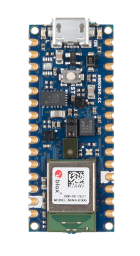
The Arduino Nano 33 BLE Sense is one of the most feature-packed Arduino boards, with a built-in temperature sensor, accelerometer, gyroscope, and microphone (and more). This makes it a great platform for building monitoring and sensing projects and devices. You'll be able to sample raw data, build models, and deploy trained machine learning models directly from the Edge Impulse Studio.
The Extremely Extensible ESP32
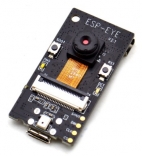
The ESP32 is a small, low cost microcontroller with bluetooth and WiFi connectivity, making it ideal for IoT products and applications. It's dual-core processor is strong enough to run TinyML models, opening up endless possibilities for building smart sensors, wearables / health devices, basic vision applications, and more.
The Espressif ESP-EYE development board based on Espressif's ESP32 chip is fully supported by Edge Impulse. The ESP-EYE is equipped with a 2-Megapixel camera and a microphone making it perfect for image recognition and audio processing applications.
Diving Into Data
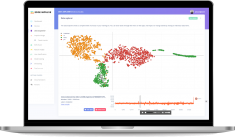
In most cases, data is the most important factor in creating a successful TinyML project. Sure, hardware selection, power, and connectivity matter too, but without good training data, your model likely won’t be accurate enough to perform it’s intended function out in the world!
Super Sony Spresense
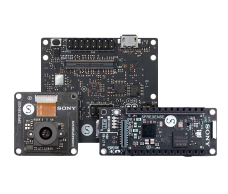
The team at Sony has created a small but powerful microcontroller board that is ready to run Edge Impulse machine learning models. With 6 Arm Cortex-M4 cores, 1.5 mb of RAM, GPS, camera input, onboard audio, and plenty of expansion options for sensors, WiFi, cellular and more, the Spresense can be used in a wide variety of projects.
Classification and Cloud Connectivity

Many times, we focus on performing machine learning locally on-device, with no need for internet connectivity. This reduces latency, simplifies projects, and can sometimes reduce costs. However, some projects do require connectivity to the cloud in order to set a status, update a dashboard, log an activity or event, or allow a user to interact with a device.
Silicon Labs' Smart Sensor Systems
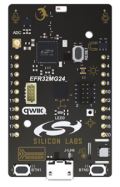
When deploying smart devices in certain environments your available space and power requirements may be limited. The Silicon Labs xG24 Developer Kit is a sensor-rich platform for prototyping AIoT devices, able to run TinyML models on just a coin-cell battery. With a dedicated AI accelerator, 6 onboard sensors, BLE, and a compact board, the xG24 can fit in tight places and capture a wealth of environmental information.
Industrial Applications of Edge AI
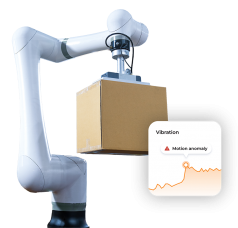
Edge Impulse makes it easy for beginners to add machine learning to their projects, using friendly hardware from companies like Arduino and Raspberry Pi. But, leveraging edge AI is becoming a common practice in many enterprises and industries too - helping to improve operations, reduce machine downtime, improve healthcare, and make existing products smarter.
Meet the Texas Instruments SK-TDA4VM Starter Kit
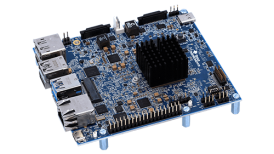
The TI SK-TDA4VM is a versatile Edge AI computer vision platform to help you build robots, smart cameras, quality control, and other vision-based applications quickly and easily. Fully supported by Edge Impulse, it's simple to build a machine learning model, and deploy it to the board.
Get Started with Edge Impulse
FAQ
Who is eligible to participate?
How do I enter the giveaway?
How do I know if I won?
- Be a Hackster community member & join the Edge Impulse platform hub.
- Sign up for an Edge Impulse account.
- Complete the activity and fill out the form above.
Everyone is eligible to complete activities and learn about Edge Impulse. However, you are only eligible to win or be awarded prizes if:
- You are at least 13 years of age
- You are not a resident of Belarus, Cuba, Iran, North Korea, Sudan, Syria, Russia or Ukraine.
- You are not involved in the execution of "Take it to the Edge."
- You are not an immediate family member or household member of a Hackster, Avnet or Edge Impulse employee.
Winners will be announced on this page within 5 business days after a quiz is closed. Winners will also be contacted via the email used when submitting their quiz.
I won a prize! When will I receive it?
Do I need to pay taxes/customs fees on my prize shipment?
The prize fulfillment process will take up to 8 weeks after winners have been announced. You will receive an email when your prize is shipped. If you need to make any changes to your address during that time, please contact us at events@hackster.io.
No, Hackster will ship all the prizes and will cover the taxes/customs fees associated with shipment.
Other questions?
If you have any questions regarding this giveaway, please contact us at events@hackster.io.
Find upcoming events, workshops, and more!

Hackster, an Avnet Community © 2022


























